Best Diet For Sphynx Cats - best food for sphynx cats
Sphynx cats are a unique and fascinating breed known for their lack of fur and affectionate nature.
As with any pet, proper nutrition is crucial for the health and well-being of Sphynx cats.
Let’s explore the best food for the Sphynx breed, including what foods to incorporate and what to avoid to keep your feline friend in optimal condition.
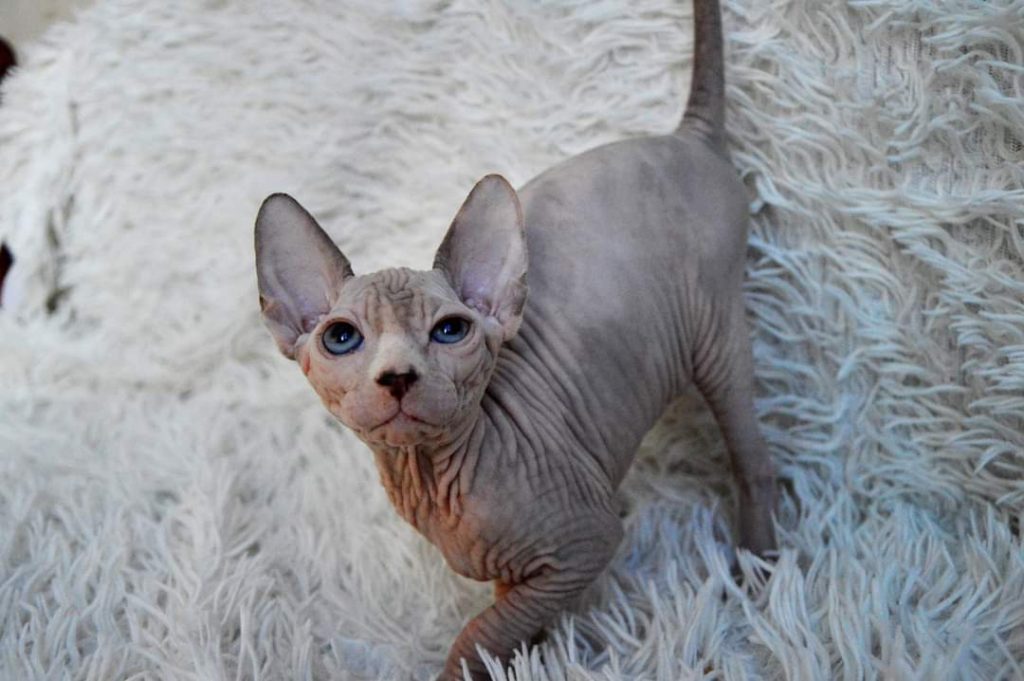
Importance of Proper Nutrition
Impact of Diet on Sphynx Cats
Proper nutrition plays a vital role in the Sphynx’s overall health and longevity.
A well-balanced diet in cat food not only supports their immune system but also promotes healthy skin and coat, which is particularly important for a breed with minimal fur.
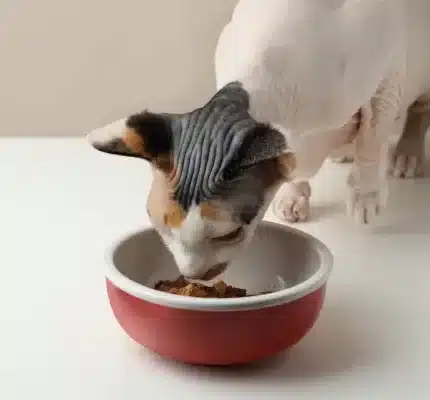
Best Diet for Sphynx Cats
Nutritional Requirements
Sphynx cats have specific dietary needs that must be met to ensure their optimal health.
Food for Sphynx cats should consist of high-quality protein, healthy fats, and essential vitamins and minerals.
Healthy Sphynx cats need a high protein diet which is low in carbohydrates, with 20-30% comprised of good fats such as omega-3 and omega-6 fatty acids.
Recommended Foods
High-Quality Protein Sources
Protein is essential for Sphynx cats as it helps maintain muscle mass and supports overall growth and development.
Opt for lean protein sources such as chicken, turkey, and fish.
Healthy Fats
Incorporating healthy fats into your Sphynx cat’s diet more is important for providing energy and maintaining healthy skin and coat.
Healthy Sphynx cats have omega-3 fatty acids from sources like fish oil or flaxseed oil in their food.
This provides more nutrients when in foods for sphynx cats.
Essential Vitamins and Minerals
Ensure your Sphynx cat receives adequate vitamins and minerals in their cat food by feeding them more of a balanced diet that includes fruits, vegetables, and supplements as recommended by your veterinarian.
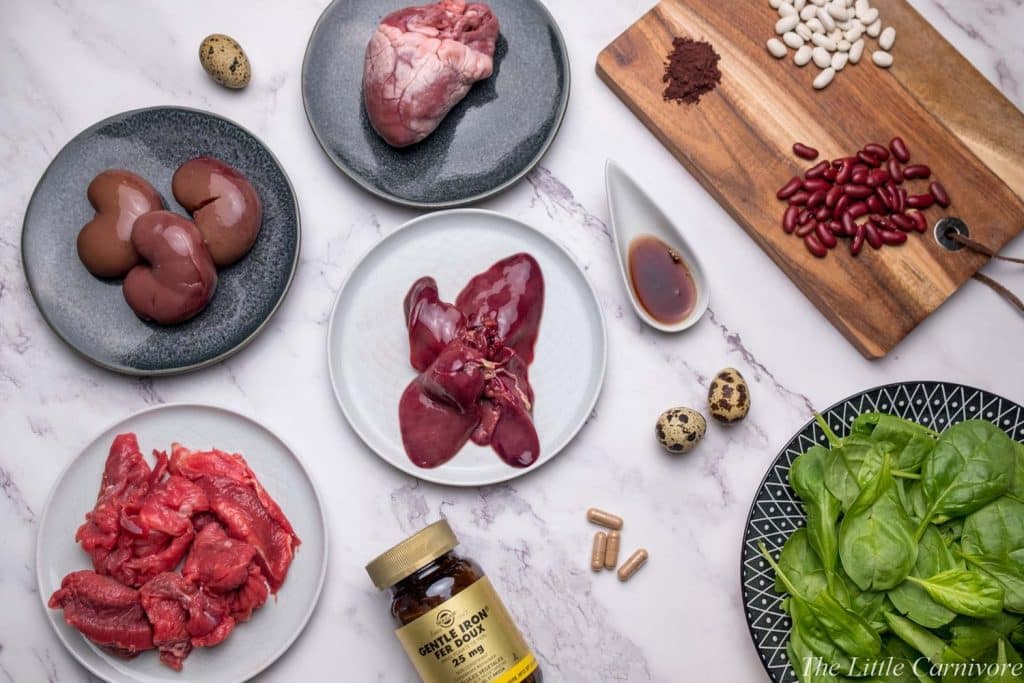
Dry food for sphynx cats and other Hairless cat breeds
Nutrition sphynx receive can be varied. Tailored nutrition in hairless cats or any cat breed for that matter can include a mixture of wet and dry food.
Giving a sphynx dry food is also a popular option for sphynx cat owners because it is convenient, easy to store, and has a long shelf life.
It also helps promote healthy teeth and gums as it helps reduce plaque and tartar buildup in feline breed.
We give our cats Royal Canin. We have found it to be quite good when we give them in limited quantity.
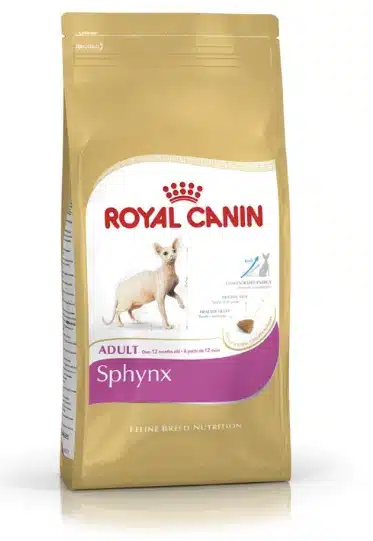
Food to Avoid giving your cat
While certain foods are beneficial for Sphynx cats, others should be avoided in cat food to prevent digestive issues or nutrient deficiencies.
Avoid feeding your Sphynx cat foods more high in carbohydrates, artificial additives, or toxic ingredients such as onions, garlic, and chocolate.
Chocolate can be poisonous for your Sphynx. Chocolate contains methylxanthines and can cause the following symptoms:
- Vomitting
- Abdominal discomfort
- High temperatures
- Diarrhea and
- Increased thirst
Products that are high in sugar provide no health benefit for your Sphynx. Sweeteners like xylitol are found in most sugary products and can cause severe liver failure in the long run.
Sphynx cats can tend to love fish. Especially tuna, and while eating tuna in small quantities will not cause any significant problems, regularly eating tuna made for humans can cause malnutrition in your Sphynx and in some cases lead to mercury poisoning.
These are an absolute no for your Sphynx. These foods cause severe anemia by destroying the red blood cells.
Do not give your Sphynx cat in small or concentrated quantities or even as a drink mix.
Even a small amount of raisins and grapes can cause your Sphynx to become ill and cause kidney failure.
Other symptoms include vomiting and or hyperactivity.
Some symptoms that may show up after about 24 hours include:
- Abdominal pain
- Reduced appetite
- Decreased urination
Raw eggs are not good for your Sphynx kittens as they may contain bacteria such as E-coli and Salmonella.
Raw egg whites also contain a protein called avidin which could interfere with the absorption of vitamin B causing skin problems for your cat.
Only give liver in very small quantities. While it is a good source of iron and protein, feeding too much to your cat can cause hypervitaminosis A in which there is an excess of vitamin A which will cause toxicity.
Feeding Schedule and Portions of your cat food
Establish a regular feeding schedule for your Sphynx cat to maintain consistency and prevent overeating.
Monitor the portion sizes of cat food to prevent obesity and adjust accordingly based on their activity level and age.
Hydration Needs
As much as you give theright food to your cats, proper hydration is essential for Sphynx cats, especially since they are prone to dry skin.
Ensure they have access to fresh, clean water at all times and consider incorporating wet food into their diet to increase moisture intake.

Supplements for Sphynx Cats
In addition to a balanced diet, a Sphynx cat is one to benefit from certain supplements to support their overall health.
Discuss with your veterinarian about incorporating supplements such as probiotics or omega-3 fatty acids into their diet.
Transitioning to new cat food for your feline
When transitioning your Sphynx cat to a new diet, do so gradually to avoid gastrointestinal upset when they eat it.
Start by mixing small amounts of the new food with their current food and gradually increase the ratio over a period of several days.
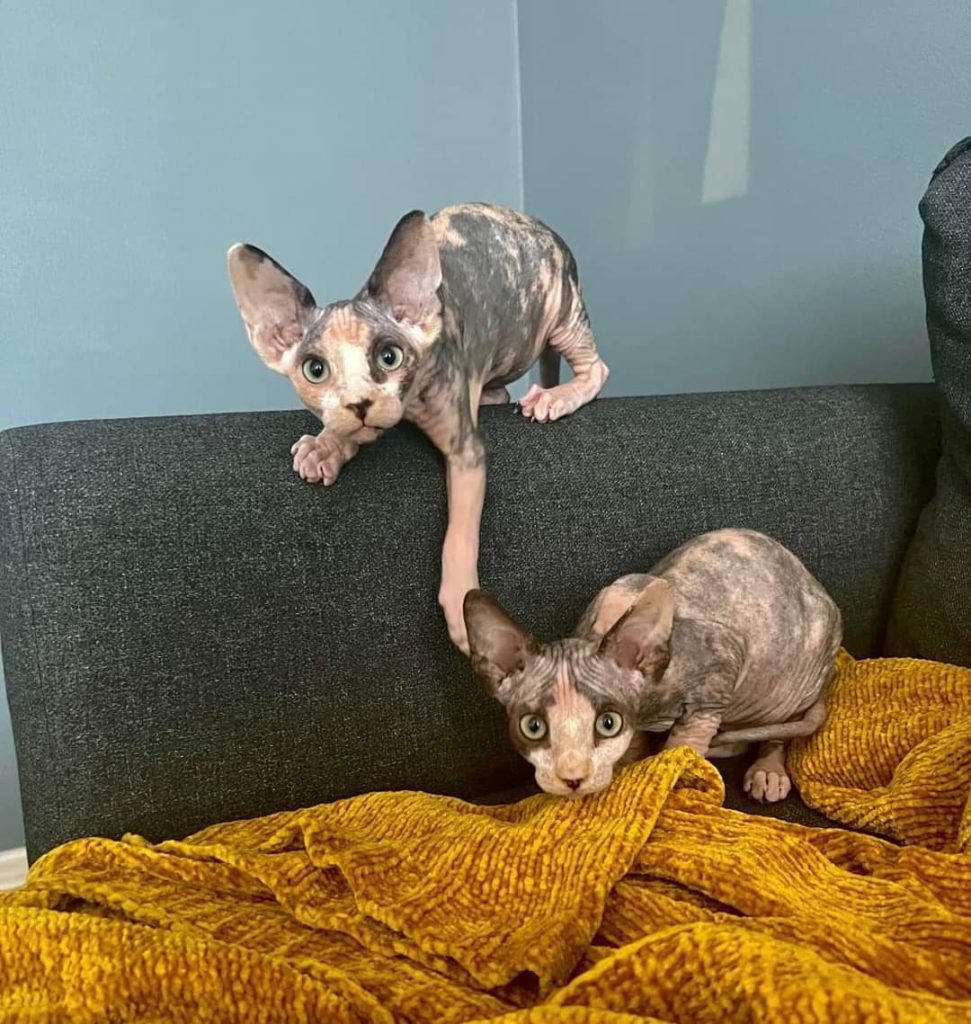
Monitoring Your Sphynx Cat's Health
Keep a close eye on your Sphynx cat’s health and behavior, as changes in appetite, energy levels, or bathroom habits could indicate underlying health issues.
Schedule regular check-ups with your veterinarian to ensure your cat remains in good health.
Common Dietary Issues
Some common dietary issues that may affect Sphynx cats include:
- Food allergies
- Obesity, and
- Dental problems.
Be proactive in addressing these issues by providing appropriate nutrition and seeking veterinary care as needed.
Consulting a Veterinarian
If you have any concerns about your Sphynx cat’s diet or overall health, consult with a veterinarian who can provide personalized recommendations based on your cat’s individual needs and medical history.
Providing the best diet for your Sphynx cat is essential for their health and well-being.
By understanding their unique nutritional requirements and incorporating high-quality foods into their diet, you can ensure your hairless feline companion lives a long, happy, and healthy life.
FAQS ON SPHYNX DIET
How often should I feed my Sphynx cat?
It’s recommended to feed adult Sphynx cats two meals a day, while kittens may require more frequent feeding.
Can Sphynx cats eat raw meat?
While some owners choose to feed their Sphynx cats a raw diet, it’s essential to consult with a veterinarian to ensure proper balance and safety.
What should I do if my Sphynx cat is a picky eater?
If your Sphynx cat is a picky eater, try offering a variety of foods and textures to find what they enjoy.
Additionally, consult with a veterinarian to rule out any underlying health issues.Are there any specific dietary requirements for senior Sphynx cats?
Senior Sphynx cats may have different nutritional needs, such as lower calorie intake and joint support.
Consult with your veterinarian for recommendations tailored to your cat’s age and health status.Can I give my Sphynx cat treats?
Yes, you can give your Sphynx cat treats in moderation as long as they are safe and nutritionally balanced.
Avoid overfeeding treats, as excessive calories can lead to obesity and weight gain.
Are you interested in adopting a Sphynx kitten? Then learn more about our adoption process or see our available kittens.